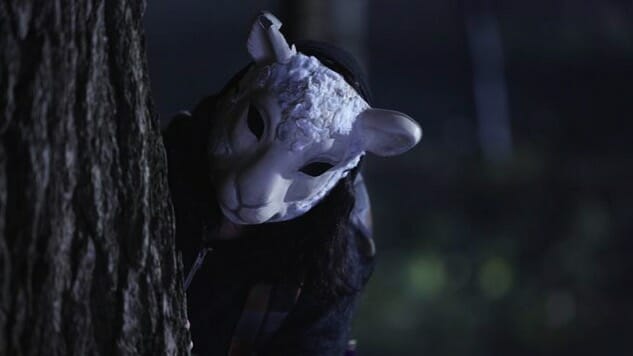
With its latest premiere, Orphan Black has officially entered its fourth year on the air. And, much like any nostalgic senior, it’s taking its time to look back. Positioning itself both as a soft reboot, as well as a time to visit the ghosts of Christmas past, the episode takes us back to 2012 where we bear witness to the final days of one Beth Childs, the Leda clone whose brutal suicide set this whole strange chain of events into motion.
While certainly not without its delightful moments, Season Three was nothing short of a messy affair—a culmination of two years of overly convoluted plotlines, peppered with increasingly half-baked plot twists. The introduction of the male Castor clones—a concept intriguing on paper—proved to be yet another layer of disorientating double crosses and identity swapping that further cluttered the once fresh and daring sci-fi drama.
With its strict focus on Beth, “The Collapse of Nature” appears to (hopefully) be making a statement about the series’ new intent. After all, whereas Orphan Black’s various conspiracies and mysteries were nice flavorings, it was the strong, specific characters that viewers latched onto. As the show’s mythology grew bigger and bigger, however, it threatened to overwhelm or devour these key qualities. Here, with the regular cast reduced to mere cameo appearances, the creative team has afforded themselves the real estate to track a single character’s emotional journey. The final result is among the strongest entries of the series in a good bit.
Given Beth’s occupation as a cop, the episode naturally lends itself to an investigation format. After getting a tip-off from a mask-wearing fellow clone (“MK”), Beth and her team locate a body whose cheek has been surgically sliced off and, perhaps more notably, boasts a bifurcated penis. “Perhaps it’s a statement on masculine/feminine duality,” one officer suggests, inviting a gender studies reading. With MK’s assistance, Beth eventually makes a connection with Dr. Aldous Leekie and his Neolution movement, but not before effectively blowing up her own life in the process.
At the risk of sounding like a broken record, one of the series’ strongest elements continues to be Tatiana Maslany’s remarkable range. Here, she manages to embody both the stern, poised Beth, as well as the shiftier MK, who—unlike Beth—has eschewed any sense of normalcy in favor of holing up in a trailer and hiding behind the aforementioned animal masks. Beth’s insistence on not wearing a mask when MK asks, while at first seeming like a simple extension of her straightforward attitude, soon reveals itself to be more of a tragic irony. Indeed, as the episode quickly clarifies, Beth’s entire existence is a mask. On the surface, she’s the consummate professional who juggles her police work, a romantic life with Paul and acting as caretaker to Alison and Cosima. Peel back this thin veneer, however, and you see a woman on the verge of a complete breakdown—someone who recreationally abuses cocaine, experiences minor anxiety attacks when left alone and gradually suspects that her boyfriend has more sinister, ulterior motives. She is, essentially, the bizarro version of Sarah—a woman who never learned to stifle her isolationist tendencies, take control of her life and open herself up to a support system; thus, she breaks down under the pressure.
In the end, the blessing and curse of “The Collapse of Nature” is that we know the tragedy that awaits Beth after she departs the comfort of MK’s couch. Thus, for the first time in several years, the Orphan Black writers are able to tell a semi-complete story and not one that stretches out for an unnaturally long period. The downside is that, with the exception of introducing MK and reiterating the continued threat of the Neolutionists, the installment doesn’t really give a clear direction to where the season can go, or what obstacles the clones will now be facing once we return to the present. Nevertheless, if “The Collapse of Nature” was intended as a series course-correction, it’s an unquestionably effective one, stripping the series of its usual window dressing and reintroducing audiences to what it fell in love with four years ago.
Whether this is all indicative of a new approach or merely a brief sojourn through past glories, only time will tell.
Mark Rozeman is a Los Angeles-based freelance writer and regular contributor to Paste. You can follow him on Twitter.